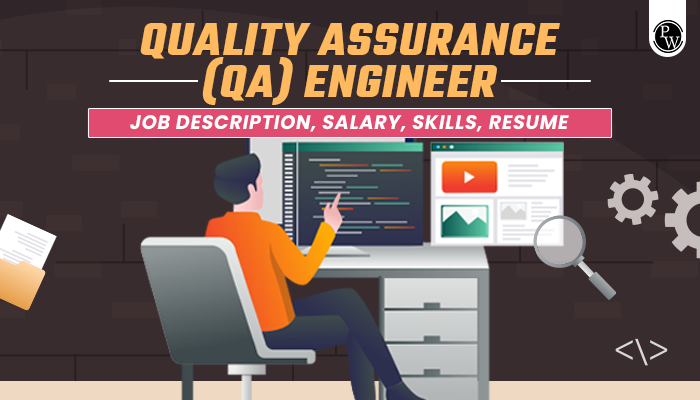A QA engineer plays a vital role in ensuring that software is thoroughly checked and meets all the necessary requirements before it is released to the public. They oversee every stage of the software’s journey, from design and development to testing and delivery.
By doing so, they ensure that the product meets the expected quality standards. QA engineers typically work in teams and report to a manager. If you’re interested in this role, it’s important to understand its responsibilities.
In this article, we will explore what a QA engineer does, outline their duties, and guide how you can pursue a career in this field.
What is a QA engineer?
QA engineering is a crucial process that ensures the delivery of high-quality products and services to clients. Its primary objective is to prevent mistakes and flaws in the manufacturing process, thereby avoiding potential problems.
It involves a range of administrative and procedural activities within a quality system to ensure that the objectives and goals of a product, service, or activity are met. QA engineering comprises primary (functional) and secondary (analytical) elements, particularly in system and system integration testing.
Understanding the role, responsibilities, and required skills associated with QA engineering is essential when designing a product or providing customer service. Numerous factors come into play, focusing on keeping customers satisfied and ensuring continued product usage or generating revenue.
To define QA engineering, there are two critical criteria to consider. Firstly, you need to establish the goal of your project. This goal outlines what you aim to achieve with your product or service. Secondly, you must determine how to measure progress toward this goal. By setting clear objectives and tracking your progress, you can effectively implement QA engineering practices to improve the quality of your offerings.
What does a QA engineer do?
A QA Engineer’s job involves utilizing their skills to identify effective ways to improve the software. They play a crucial role in communicating their ideas to their superiors and obtaining approval for implementing enhancements within a project.
The skills of QA Engineers involve finding solutions to various issues in software programs. Their expertise lies in troubleshooting and resolving these problems to ensure the software functions smoothly.
Job Description of a QA Engineer
A Quality Assurance (QA) Engineer is responsible for creating and implementing strategies to ensure quality and recommending solutions to address quality issues. Within specific projects, QA specialists perform various roles, including the following four main responsibilities:
Test Analyst: This role involves static requirements testing to ensure the products are comprehensive and accurate.
Test Designer: Test Designers are responsible for developing a set of tests required for the project and organizing the appropriate testing settings.
Test Executor: Test Executors execute pre-planned tests, document and describe any defects identified, and provide methods to reproduce or fix them.
Test Manager: The Test Manager oversees testing activities, ensuring deadlines are met, adhering to schedules, controlling test requirements, assigning tasks to team members, and collaborating with stakeholders.
To meet quality requirements, a QA Engineer should monitor all stages of software development to identify and resolve any system issues that may arise. The QA Engineer actively monitors and addresses these issues and ensures the software meets the desired quality standards.
Recommended Course
- Decode DSA with C++
- Full Stack Data Science Pro Course
- Java For Cloud Course
- Full Stack Web Development Course
- Data Analytics Course
QA Engineer Salary
The average base salary for a QA Engineer in India is ₹385,530 annually. The salary range for this role can vary from a minimum of ₹238,000 per year to a maximum of ₹1 million per year. The following table provides a detailed breakdown of the QA Engineer’s salary based on experience.
For individuals with less than a year of experience, entry-level QA Engineers can expect to earn an average total salary of Rs. 241,753, which includes tips, bonuses, and overtime pay. With 1-4 years of experience, early-career QA Engineers earn an average total remuneration of Rs. 361,397.
Mid-career QA Engineers with 5-9 years of experience typically earn a total income of Rs. 589,574. Experienced QA Engineers with 10-19 years of experience earn an average total remuneration of Rs. 728,027. Those in the late stages of their careers (20 years and above) earn an average salary of Rs. 925,000.
The salary of a Quality Assurance (QA) Engineer also varies from company to company. Therefore aspiring QA engineers need to check out the salary of a QA engineer in different companies.
| Employers | Avg Salary per year |
| HCL Technologies Ltd. | ₹2,53,000 |
| Flextronics International | ₹2,55,500 |
| Synerzip | ₹3,50,000 |
| Tata Consultancy Services Ltd | ₹4,64,516 |
| Dassault Systems Inc.l | ₹5,71,402 |
| Fidelity Investments | ₹6,82,609 |
| Oracle Corp. | ₹7,74,194 |
| Amazon.com Inc. | ₹8,24,000 |
| Oracle | ₹9,27,119 |
Skills Required to Become a QA Engineer
Being a software quality assurance engineer requires diverse skills and knowledge in technology, engineering, mathematics, science, communication (both written and verbal), problem-solving, reasoning, logic, and practical abilities like excellent documentation and project management skills. Software quality assurance engineers should possess the following specific skills:
- Education: A bachelor’s or associate’s degree is typically required.
- Knowledge of QA Approaches: Familiarity with software quality assurance approaches, tools, and processes.
- SQL and Scripting Skills: Proficiency in SQL and scripting languages.
- Work Experience: Prior experience in application development and quality assurance is preferred.
- Familiarity with QA Tools: Understanding of various quality assurance tools.
- Testing Tool Proficiency: Practical knowledge of software testing tools such as UFT/QTP, Katalon, Microsoft Coded UI, Ruby, Cucumber, Watir, Selenium, and others.
- Technical Expertise: A solid understanding of software technologies and the ability to work with different software programs, including web apps, Windows-based applications, mobile apps, etc.
- Familiarity with QA/Testing Tools and Technologies: Proficiency in working with QA/Testing tools and technologies such as Azure DevOps or TFS, SOAP UI, HP ALM, JIRA, and others.
- Test Planning: Ability to create test plans.
- SQL Scripting: Mastery of SQL scripts and working with various databases.
- Setting Standards and Procedures: Establishing standards and procedures for assessing product quality and readiness for release.
- Bug Identification: Skill in identifying software bugs.
- Innovation and Streamlining: Ability to boost innovation while streamlining the testing process.
- Agile Development Experience: Familiarity with Agile development methodologies.
- Web-Based Testing Knowledge: Working knowledge of web-based testing applications.
- Flaw Analysis and Reporting: Analyzing, classifying, and reporting flaws throughout testing.
- Problem Recognition: Ability to recognize potential issues.
- Manual and Automated Testing: Proficiency in both manual and automated testing.
- Interface Design Evaluation: Examining interface design for reliability and usability.
- QA Module Knowledge: Detailed understanding of QA modules.
Software Development Life Cycle (SDLC): Comprehensive software development life cycle knowledge.
However, technical skills alone are not sufficient. Soft skills are equally important for a successful career as a QA Engineer. These soft skills include:
- Analytical Skills: Ability to analyze and think critically.
- Problem-Solving: Aptitude for problem-solving.
- Adaptability: Flexibility and adaptability to new technologies.
- Communication Skills: Excellent verbal and written communication skills using technical and non-technical language.
- Documentation: Proficiency in documenting test cases and conducting risk assessments.
- Test Progress Tracking: Keeping track of test progress and outcomes.
- Time Management: Ability to work under strict deadlines and possess good time management skills.
- Teamwork: Working well as a team and collaborating closely with product managers, developers, and department heads.
- Initiative and Proactiveness: Taking initiative and being proactive in addressing challenges.
- Persistence: Demonstrating persistence in problem-solving.
Developing and mastering these skills will help in excelling as a QA Engineer and effectively communicate with team members and stakeholders, ensuring efficient testing processes and contributing to the success of software projects.
PW Skills Provide Various Platform
Frequently Asked Questions
Q1. What skills should a Quality Assurance Engineer include on their resume?
Ans. The most common skills found on top resumes include Quality Assurance, Manual Testing, Regression Testing, Test Planning, Test Automation, Software Quality Assurance, and Jira.
Q2. What are the skills required to become a Quality assurance engineer?
Ans. Quality assurance skills are a combination of hard and soft skills used to meet quality standards in various professions, including test engineering, QA management, and QA testing.
Q3. Is QA considered a technical skill?
Ans. The role of a QA engineer involves solving complex technical problems and managing software testing challenges.
Q4. Enlist 4 points of quality assurance engineer.
Ans. The quality assurance process involves four stages: planning, implementation, checking, and adjustment.
Q5. What are the types of QA?
Ans. The Different Types of QA Software Testing
- Unit Testing.
- Component Testing.
- Integration Testing.
- End-to-End Testing.
- Performance Testing
Recommended Reads
Data Science Interview Questions and Answers
Data Science Internship Programs






